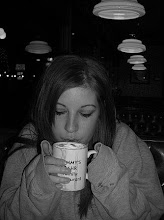My sister talks to me about everything. She is my best friend, counselor and protector. My sister is everything to me. My sister has been under enemy fire and gone to sleep with constant blasts from nearby mortars shaking her bunk.
She is generally a well spoken person, but when Iraq becomes the topic of conversation, she experiences a loss for words. My sister’s memories from her first deployment to Iraq are mostly in images, thoughts and fragments.
The morning of her first convoy from Kuwait to Baghdad, Iraq, Private First Class Noel Purdie said she felt like she was suffocating when she put on her uniform. She was wearing the typical Army combat uniform: T-shirt, pants, boots, improved body armor suit, groin protector, ear plugs. She had 11 pounds of ammo strapped to her vest, a 30 pound medical aid bag secured on her back, a personal bag that carried her sleeping bag and extra uniforms in hand and her M-16 rifle slung across her shoulder. The extra 40 pounds of weight and layered uniform increase the temperature from 80 to about 90 degrees.
She didn’t feel the intensity of the heat until she climbed into the backseat of the HUMVEE, which happened to have a temperamental air conditioner. The heat came in waves and occasionally sweat dripped off her face and down her neck. She sat with her rifle between her legs, muzzle down thinking “I can’t believe this is real. I miss my family. I want to go home. I want to stay alive. I’m scared. It’ll be ok, it’ll be ok. Nothing is going to happen.” She tried to prepare herself for the three day drive, eight to ten hours a day, stopping only to refuel and sleep. They were driving slow, scanning the land for improved explosive devices (IEDs).
She was nervous and scared. She was thinking about the training that led her here. She had only been in the Army for a year. She was trying to remember all of the stories other soldiers told her about IEDs, enemy fire and Iraqis ambushing convoys—especially between Kuwait and Baghdad.
On the second day her truck finally crossed the border into Iraq. “The TV was right. I can’t believe people live like this.” Children were on both sides of the street. She said they looked like they haven’t bathed in a few days, they were barefoot, their clothes were ragged and they were skinny—bony, their elbows and knees were prominent. She thinks, “I want to hug them and tell them it will be ok.” She noticed one room shacks along the road. They were made out of wood, tires, soda cans. “I could never live like that. I wouldn’t want to live if I had to live like that.”All she could smell was oil. “It’s so dirty. Trash everywhere.” The kids run after the truck shouting “Chocolate, chocolate!”
She replayed everything she had been trained. “Seeing those kids makes my heart break. But, I have to protect myself. If I had to, could I really shoot this child? If they do something, could I seriously stick my head out this window and fire at them? If my life is in danger, I’ll do anything. Me and my soldiers have to make it home.”
The third day, her convoy stopped. The road was coded black—something dangerous was found within the last 24 hours. “All I can hear is gun fire. I don’t know where it is coming from, who it is or what’s going on.” The road cleared two hours later and after a couple hours of driving, her convoy made it into Baghdad.
We set a spot for her at the dinner table. She was settling into her new barracks in Baghdad. It was Christmas Eve. She is my best friend, counselor and protector. My sister is everything to me. But, she can no longer talk to me about everything. I don’t know any of her stories about missions, being under enemy fire or encountering an IED. I don’t know what she went through or what she is still probably going through. Sometimes I feel like my sister never came back from Iraq.
Friday, April 24, 2009
Subscribe to:
Post Comments (Atom)

No comments:
Post a Comment